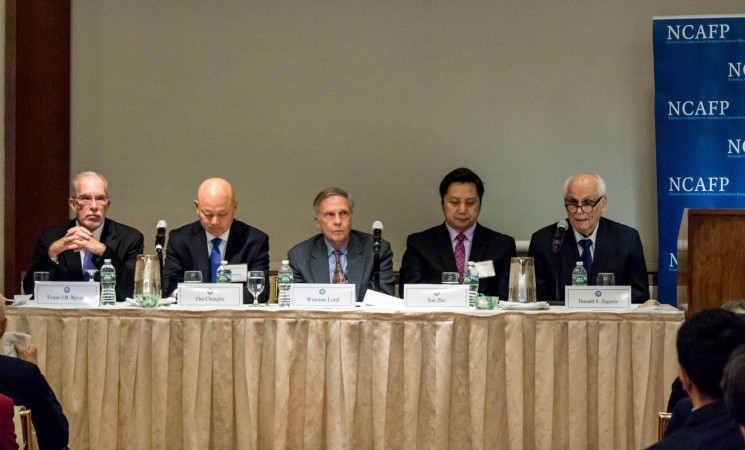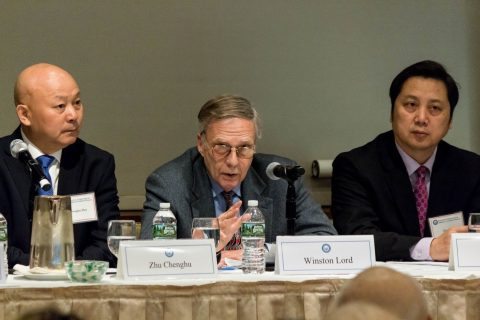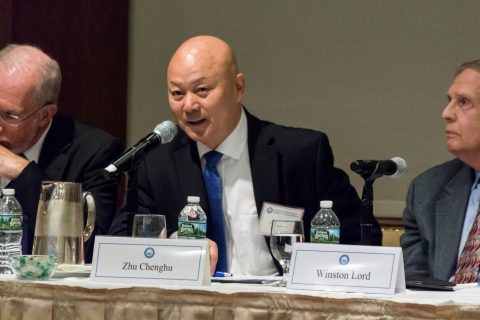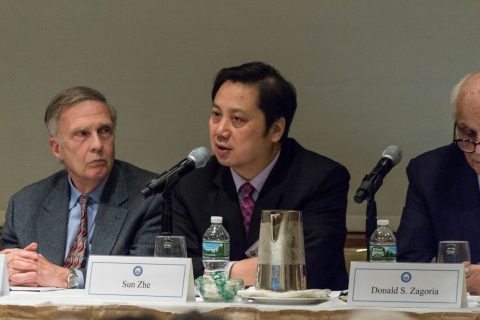On March 23, 2016, the NCAFP held a panel discussion on “U.S.-China Relations: Partners, Rivals or Adversaries?” featuring former officials and leading scholars from the U.S. and China. The panel was attended by members of the NCAFP as well as other members of New York City’s diplomatic, academic and policy community.
Ambassador Winston Lord began the panel by describing U.S.-China relations as darker and tenser than the past. He credited the downturn in the perception of U.S.-China relations by American policymakers and leading thinkers to President Xi Jinping’s policies, particularly those aimed at creating an anti-Western or anti-American campaign, as well as suppressing domestic dissent.
Overall, Amb. Lord called for the U.S. to seek continued friendly relations with China, but without illusions regarding China’s democratic development. He listed several areas of cooperation: economics, including concluding the Bilateral Investment Treaty and welcoming China’s Asian Infrastructure Investment Bank to play a positive role in regional development; climate change; global health challenges; and cyber-theft, particularly commercial theft. He also listed several areas in which the U.S. should be more tough: Freedom of Navigation operations in the South China Sea, while staying neutral on the sovereignty questions; North Korea’s nuclear program and the need for full implementation of UN sanctions; and several matters related to freedom of speech and freedom of the press, such as reciprocating China’s denial of journalist and academic visas with its own, reviewing Confucius Institutes, and increasing support to Voice of America, Radio Free Asia and other outlets.
He also called for the Presidents of both countries to continue regular summits on strategic issues without aides and emphasized that the Pacific community is big enough for both China and the United States. Furthermore, each country should focus more on fixing its own domestic problems, especially in a year of political transition on both sides.
Major General Zhu Chenghu stated that the U.S. and China were partners in some areas and rivals in others. He characterized the South China Sea disputes as a ‘chicken and egg’ problem of action and reaction, and emphasized that while he believes the United States does not seek to contain China, it is difficult to convince the Chinese people of this in light of U.S. surveillance operations on China’s coast and military drills that imagine China as an enemy.
He listed three problems in security relations: distrust, particularly of each other’s strategic intentions; miscalculation that stems from such distrust; and an action/reaction cycle in the security realm that is motivated by miscalculations. And yet, he concluded, only by respecting each other and working together can the U.S. and China solve the world’s most pressing problems.
Mr. Evans J.R. Revere opened his presentation by identifying a central task for the U.S. and China: managing rivalry and eliminating adversarial elements. The bilateral relationship, he continued, is burdened by the interests of the U.S. as a predominant player in East Asia alongside a China that is asserting itself as a dominant power in Asia. The two greatest problems in the bilateral relationship are 1) a fundamental lack of strategic trust that stems from a lack of transparency, a lack of communication and historical factors; and 2) profound differences in the political, social and economic systems, or a values gap between America’s open democratic system and China’s closed authoritarian system. He stressed that conflict is not inevitable, but that we need to find ways of expanding what he called the ‘zone of cooperation.’
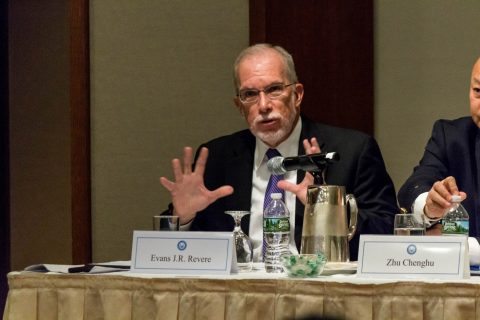
Evans Revere discusses strategic trust in the region
One such area of cooperation is working together to end North Korea’s nuclear weapons program, which has the potential to destabilize the entire region. The two countries have recently joined forces to levy strong sanctions against the DPRK, and further cooperation will be necessary to ensure full implementation of these sanctions and close coordination should the DPRK return to the negotiating table.
Professor Sun Zhe agreed with a previous formulation of Amb. Lord’s, calling the bilateral relationship ‘sweet and sour.’ He found it characterized by 4 dimensions: broad contact, cooperation, serious competition, and confrontation. Although he noted that U.S.-China military to military dialogue is relatively robust right now, he also called on both countries to have more dialogue as a way of preventing unnecessary military spending that would be put to better use on education, infrastructure and other domestic needs. He advised both countries not to let 3rd country elements affect bilateral relations, or to limit the spillover of such conflicts.
He outlined three barriers to our military to military relationship: outdated laws and regulations forbidding exchanges; continued U.S. reconnaissance activities in the South and East China Seas; and continued U.S. arms sales to Taiwan. He also noted that the two sides’ respective media need to do a better job presenting the image of the other. In conclusion, he hoped that both countries could focus on domestic politics to help themselves.
The question and answer session stressed the importance of international law, the challenges facing China’s economy, and the DPRK nuclear issue. The panelists emphasized that all countries should follow international law, that China’s slowing economy is affecting its defense budget as well as its resource procurement overseas, and that the DPRK issue is a headache for both sides, but that the U.S. and China have vastly different interests on this topic.
China, which borders North Korea, hopes that attention can be paid to the DPRK’s security concerns, which motivate their nuclear weapons program. Mr. Revere stressed that the U.S. has put every concern of the North Koreans on the negotiating table, including peace treaties and security guarantees, but without a positive response from the DPRK the time has come to present the starkest choice possible through pressure from sanctions—either put in jeopardy regime security, the one thing North Korea values above nuclear weapons, or return to negotiations aimed at freezing and eventually dismantling their nuclear program.

